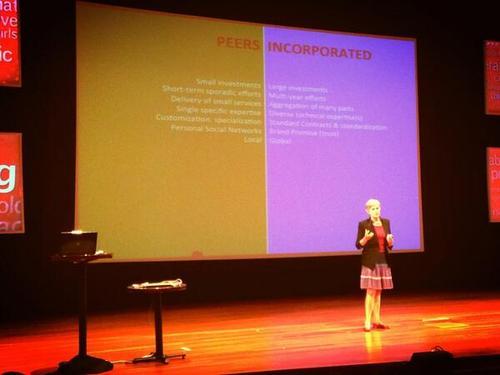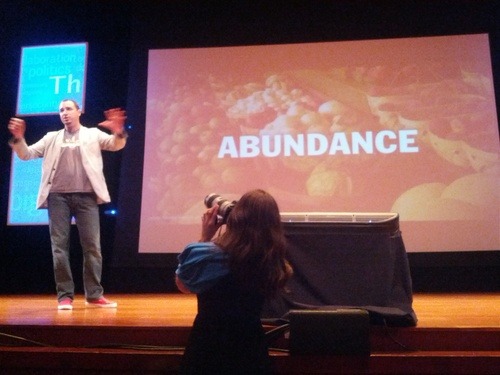
Photo by @brianquinn
Robin Chase (@rmchase), founder of ZipCar and BuzzCar, started the first company WAY back in 2000. It made renting a car as convenient as owning car, and “right-sized the asset”, meaning you only pay for what you use. In addition to huge savings and new freedoms for consumers, this meant fewer cars sitting around unused in cities.
But less obviously, Zipcar stretched the definitions of “consumers” and “producers” in an economy. Robin prefers ‘collaborators’ as a more modern term. The company’s success hinged on the assumption that most people are good. That trust, and bond with their customers, was key to creating the company.
Skype, Facebook, eBay, YouTube, Wikipedia, et al do the same thing: take excess capacity (sharing) and combine it with a platform for participation. Robin’s slept in all kinds of beds, from hotels to a teenager’s bedroom.
InterContinental Hotels Group has 645,000 hotel rooms after sixty years of existence. They’ve been surpassed by AirBnB, which has listed 650,000 rooms in 4 years of existence. CouchSurfing has 1.5 million beds in 8 years.
What’s going on here? Robin compares the strengths of industrial economies, with their large, global investments over many years, with the strengths of individuals. Individuals make small investments sporadically in local ways. The combination is what Robin calls Peers, Inc. It matches the strengths and values of each side. If the corporations take too much, the peers won’t participate. If the peers can’t be organized in a profitable way, the corporations won’t build the platforms (or those platforms will lose to more corporate instances).
Platforms offer economies of scale and high-growth. 3 million passengers a year ride in Europe’s BlaBlaCar, a ridesharing company. Excess capacity can also include smartphones’ capacity, in app marketplaces. Fiverr, Etsy, TopCoder have all scaled incredibly quickly in a matter of years. Peers offer diverse offerings, long tails of content, innovation, resilience, and redundancy.
Robin promises we can have it all with this combination. And switches gears to consider the environmental catastrophe we’ve found ourselves in.
The World Bank’s 4 degrees (Celsius) report assumes every corporation comes through on every weak climate promise they’ve made, and finds that we’d still be screwed, climatically speaking. Robin finds herself thinking about what the end game of 11 degree Fahrenheit temperature increases over land will mean in the summertime and for her children.
She quotes a friend and academic, Ben Banerjee, saying “You can’t solve exponential problems with linear solutions.” To Robin, the combination of peer behaviors and industrial economies is our shot at exponential solutions.

Nick Grossman (@nickgrossman) started OpenPlans, and is now Activist in Residence at Union Square Ventures, the VCs behind companies like FourSquare, Meetup, and Twitter. Nick is researching peer economies at MIT’s Center for Civic Media.
Networks are exposing new abundances in ideas, stuff, money, help, information. These peer-to-peer networks transfer power.
Any time you move power around, you run into challenges, Nick says. A carpooling network in Toronto was shut down in 2008, and just last month, New York state ruled peer to peer apartment rentals illegal.
There are things to figure out, like whether insurance covers us if we’re borrowing a stranger’s car. Nick pulls up a headline, “Mike Bloomberg wants to ‘fucking destroy’ the taxi industry”, where Mayor Bloomberg’s frustration with the slow, corrupt, non-innovating industry boiled over.
Plato forecasted doomsday if the alphabet became popular. French elites expected a new age of barbarity if the novel were to take off. The film industry tried to slay the VCR in its infancy before the VCR brought the industry great wealth.
“Crazy shit happens on the internet, and in cities like New York, where you let people do things and be weird.” But it doesn’t mean the end of the world. We can evolve our systems of regulation to get more good than bad.
Nick points to Section 230 of the Communications Decency Act, the safe harbor provision that protects companies like YouTube from getting sued out of existence every time a user uploads something illegal. It applies to computer networks, but peer economies tend to directly involve the real world. AirBnb could be regulated as a hotel, a phonebook, or something new entirely. We’ll have different policy frameworks for information processors than we will for taxi companies. This new generation of companies forces new definitions.
Nick considers himself a “professional amateur,” and looks to the potential of peer networks to tackle hard problems together. After Hurricane Sandy, AirBnB (the company) scrambled to let people donate spare rooms to their fellow citizens. Etsy is working with cities to train citizens in entrepreneurship. Consent to Research is a campaign to let you donate your health data for a wide range of medical research, which is currently illegal.
Unlocking value will require partnerships, interoperability of public institutions, data exchange, and the biggest challenge: Privacy.
Nick suggests Regulation 2.0. Peer networks have created their own internal systems for trust and safety of data. In fact, these web networks are acting like governments in their own right by regulating their users. We’ll want the ones that last to protect citizens’ privacy, security, and data access. And we’ll need to ensure the community itself has some power.
